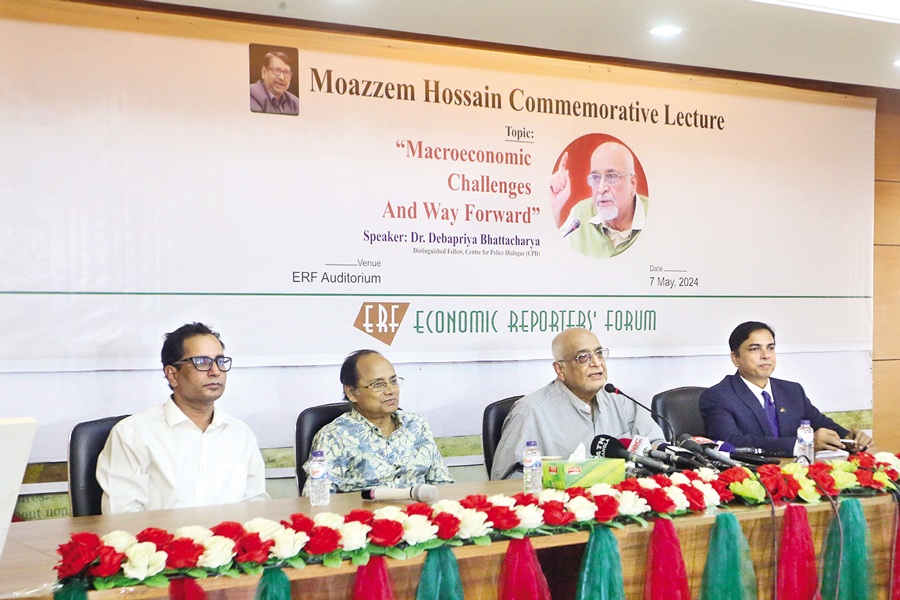
Published :
Updated :

 Economic growth data in Bangladesh are like a 'threadless kite' that hardly match up with state of investment, employment and allocations for health and education, says an economist about macroeconomic mismatches he finds.
Economic growth data in Bangladesh are like a 'threadless kite' that hardly match up with state of investment, employment and allocations for health and education, says an economist about macroeconomic mismatches he finds.
Dr Debapriya Bhattacharya, distinguished fellow of the Centre for Policy Dialogue (CPD), made the observations at a 'Moazzem Hossain Commemorative Lecture' on Tuesday while making detailed deliberations on the country's economic and financial situation, including GDP, forex and development projects.
He likened the country's GDP growth to a Boeing running with on single engine as it is "not aligned with other economic factors".
On recent restrictions on entry to the Bangladesh Bank (BB) for journalists, Dr Bhattacharya said something is "fishy" in the central bank that prompts it to impose the ban.
"Market syndicates may get active taking advantages of non-availability of real-time import data in public domain as selective importers are controlling major commodities' import," he told his audience.
Economic Reporters Forum (ERF) organised the commemorative lecture on 'Macroeconomic Challenges and Way Forward' at its office in honouring contribution of the late Hossain, who was founder editor of The Financial Express and former ERF President.
"The country is reeling through a state of lawlessness to blindness and then accidental injury," he said in his figurative speech.
He recommends assessing country's debt sustainability that appears as a "challenge now dashing Bangladesh's long-established image on payback of loans".
To exemplify financial crunch Dr Debapriya Bhattacharya points out that the government has sought two-year extension of the repayment period of the loan for Rooppur nuclear power plant while profit repatriation of foreigners facing obstacles and footing the airlines' fuel bills became irregular.
Such incidents of default on loans like the Rooppur one may appear again as the country may "fall into debt trap by 2026", he said on a note of precaution.
Elaborating on his scepticism about data, the economist said, "Economic Relations Division (ERD) is designated to assess the debt sustainability but it can be questioned whether it is publishing real data or tampering with to satisfy politicians."
Incumbent editor of the FE Shamsul Huq Zahid also attended the programme and spoke on contribution of the late Hossain to developing economic reporting in the country. President of ERF Refayet Ullah Mirdha and General Secretary Abul Kashem also attended the programme.
"It seems that economic journalists' access to information may cause sabotage if transparency ensured," Mr Debapriya said about the BB access ban. He thinks such restriction on access to data contradicts government's vision of building up a smart Bangladesh.
"BB discloses dependable data compared to that of the other entities of the government. Such restriction may tarnish its image and may lead to multiple problems," he told the function of economic reporters, who have registered their grievances over the regulatory measure.
He alleged lawmakers' inefficiency to act on the basis of realtime data available in ibas++.
The economist finds fault in development financing as he said projects were adopted with overestimated, 'cut- throat' costs.
Further dwelling on the macroeconomic front Dr Debapriya said the size of budgets had not increased in real terms due to poor implementation and deficit in domestic revenue mobilisation against "unrealistic" targets. "Late Moazzem Hossain is missed at this point as his economic analysis was highly balanced."
Dr Debapriya suggests direct tax collection shifting dependence on indirect taxes, efficient expenditure of taxpayers' money, cutting tax exemption cautiously from large businesses so that small and medium enterprises can sustain, upward revision of tax-free ceiling for individual taxpayers, focus on progressive taxation.
Given the country's impressive crop yield this year, Dr Debapriya suggests that the government should build a food stock for ensuring food security of the country's vulnerable population.
He also calls for making family cardholders' names public to ensure transparency of local representatives.
The CPD senior had a word of appreciation for an increase in the open- market-sale activity of the government for marginal-income group of people.
On remittances, he said the rate of incentives at 2.0 to 3.0 per cent meant to check Hundi would not be effective unless the government ensured flexible rates of return and rates of interest.
On recent change in the ownership of a bank, Dr Debapriya questioned if the liable parties would shoulder the burden of huge non-performing loan. He recommends that allocations on health and education must go up in the next budget by way of curbing waste of revenue and ensuring transparency.
doulotakter11@gmail.com


 For all latest news, follow The Financial Express Google News channel.
For all latest news, follow The Financial Express Google News channel.